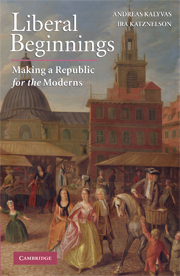Book contents
- Frontmatter
- Contents
- Acknowledgments
- 1 Beginnings
- 2 The Rhetoric of the Market: Adam Smith on Recognition, Speech, and Exchange
- 3 Agonistic Liberalism: Adam Ferguson on Modern Commercial Society and the Limits of Classical Republicanism
- 4 After the King: Thomas Paine's and James Madison's Institutional Liberalism
- 5 Embracing Liberalism: Germaine de Staël's Farewell to Republicanism
- 6 On the Liberty of the Moderns: Benjamin Constant and the Discovery of an Immanent Liberalism
- 7 After Republicanism: A Coda
- Index
- References
4 - After the King: Thomas Paine's and James Madison's Institutional Liberalism
Published online by Cambridge University Press: 05 September 2012
- Frontmatter
- Contents
- Acknowledgments
- 1 Beginnings
- 2 The Rhetoric of the Market: Adam Smith on Recognition, Speech, and Exchange
- 3 Agonistic Liberalism: Adam Ferguson on Modern Commercial Society and the Limits of Classical Republicanism
- 4 After the King: Thomas Paine's and James Madison's Institutional Liberalism
- 5 Embracing Liberalism: Germaine de Staël's Farewell to Republicanism
- 6 On the Liberty of the Moderns: Benjamin Constant and the Discovery of an Immanent Liberalism
- 7 After Republicanism: A Coda
- Index
- References
Summary
The relationship between republicanism and liberalism that was so central to the theoretical explorations of Adam Smith and Adam Ferguson was transformed into a demanding practical and historical political endeavor for the founders of the American republic. Rather than reflect on hypothetical possibilities, James Madison, Thomas Paine, and their colleagues moved the question of whether a republic could be built for modern times into a concrete political project. A luminous generation of revolutionaries grappled with how a persistent commitment to the classical republican tradition could guide their choices and actions. Pursuing this path, they confronted issues and challenges already identified by prior thinkers, as they turned to the design of institutions to secure a viable and enduring free government.
The creation of the American republic is a decisive site for understanding how republican themes and ideas turned in a liberal direction. Key theoretical works, written in the midst of this unprecedented situation, highlight the conceptual changes and institutional innovations that were advanced as the globe's first modern republic became the world's most archetypical liberal democracy. As it unfolded, this complex undertaking became the explicit and focused object of an almost obsessive analysis by the period's leading thinkers and political actors.
- Type
- Chapter
- Information
- Liberal BeginningsMaking a Republic for the Moderns, pp. 88 - 117Publisher: Cambridge University PressPrint publication year: 2008
References
- 1
- Cited by



